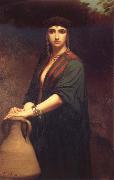
Oil On
Canvas, Real Flavor of Old Masters
|
Charles Landelle
|
|||
|
|
|||
| 1812-1908 French painter. His father, a calligrapher and musician from Mayenne, moved to Paris in 1825 to take up a post as musician in the Tuileries. Ary Scheffer, whom Landelle met through his father's contact with the Orleans court, encouraged him to become a painter. He registered at the Ecole des Beaux-Arts on 2 October 1837 as a pupil of Paul Delaroche and made his debut at the Salon in 1841 with a Self-portrait (Laval, Mus. Vieux-Cheteau). His first success, Fra Angelico asking God for Inspiration , indicated a sentimental, religious tendency in his work, which alternated with pretty pictures of young girls. Charity. commissioned by Antoine Vivenel (1799-1862), was followed by Idyll and Elegy (untraced), which were bought by the dealer Adolphe Goupil on the opening day of the 1844 Salon. The contract to buy also included Goupil's right of first refusal on the reproduction of all Landelle's future work. Subsequently, he painted the Three Marys at the Tomb in the pious manner of Ary Scheffer and a sweet, angelic St Cecilia, commissioned in 1845 by the Prefect of the Seine, in which elements of the early Renaissance art seen by Landelle on a trip to Italy in 1845 combined with the soft, pale style common among some of his colleagues from the studio of Delaroche. He also painted religious works for St Roch (1850), St Germain l'Auxerrois (1856) and St Sulpice (1875) churches in Paris. | |||
|
|
|||
|
|
Peasant Woman new12/Charles Landelle-559787.jpg Painting ID:: 39979 Visit European Gallery |
mk155 1866 Oil on canvas 131.5x84cm | |
Height Width |
INS/CM |
||
|
X |
|
||
|
|
|||
|
Kazimir Malevich
|
|||
|
|
|||
| 1878-1935 Russian painter, printmaker, decorative artist and writer of Ukranian birth. One of the pioneers of abstract art, Malevich was a central figure in a succession of avant-garde movements during the period of the Russian revolutions of 1905 and 1917 and immediately after. The style of severe geometric abstraction with which he is most closely associated, SUPREMATISM, was a leading force in the development of CONSTRUCTIVISM, the repercussions of which continued to be felt throughout the 20th century. His work was suppressed in Soviet Russia in the 1930s and remained little known during the following two decades. The reassessment of his reputation in the West from the mid-1950s was matched by the renewed influence of his work on the paintings of Ad Reinhardt and on developments | |||
|
|
|||
|
|
peasant woman new23/Kazimir Malevich-538578.jpg Painting ID:: 68764 Visit European Gallery |
1930 oil on canvas 98.5x80 se | |
Height Width |
INS/CM |
||
|
X |
|
||
|
|
|||








